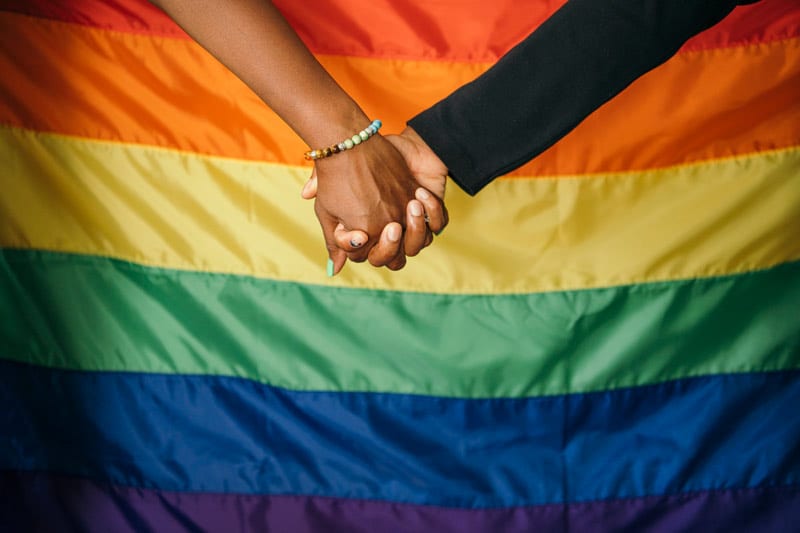LGBTQIA: Lesbian, gay, bisexual, transgender, queer or questioning, intersex and asexual or allied.
Despite the legalization of same-sex marriage and the inroads made in LGBTQIA advancement in the past several decades, members of this population are still victims of violent crime at an alarming rate each year, according the Human Rights Campaign (HRC). The organization reports that nearly half of all transgender people are sexually assaulted at some point in their lifetime, while 44 percent of lesbians and 61 percent of bisexual women have experienced rape, physical violence or stalking.
Violence isn’t the only issue facing the LGBTQIA population, either. According to research from UCLA’s Williams Institute, 85 percent of LGBT students have experienced verbal harassment, while 58 percent of LGBT youth have felt unsafe at school. Despite this, less than half of all states have anti-discrimination or anti-bullying laws protecting this population. So, how do you support your friends who are members of the LGBTQIA community?
Step one: Understand that their struggle is real and that our society still has a lot of work to do toward equality.
Here are some more measurable things you can do to support your LGBTQIA friends and family members.
- Don’t Make Assumptions—Remember that trans and genderqueer people come in all colors, ages, genders, professions and, yes, even political orientations. One of the best things you can do to show your solidarity is to suspend assumptions. When in doubt, ask with an open mind—i.e., “Hi, I’m Joe and my preferred pronouns are he and him. How about you?”—and listen. Remember that gender and sexual orientation are separate.
- Ask Questions and Listen—The most important thing you can do when providing support to anyone who isn’t like you is to come into the conversation with a clean slate, free of any judgment or prejudice. As long as you make it clear that you’re not bringing any predispositions to the table, you can foster a comfortable, open dialogue that helps you learn.
- Rock Your Pride—Who says straight people can’t rock the rainbow? Whether it’s a head-to-toe pride suit or a pair of rainbow socks, your LGBTQIA apparel will help signify to everyone that you’re an ally. You can also celebrate pride by giving your LGBTQIA buddies some amazing gay pride swag that celebrates inclusiveness and acceptance.
- Be Inclusive—Speaking of inclusiveness, remember to do your best to include your genderqueer, trans, gay and bi allies just like you do your straight ones. Don’t keep them away from certain friends or family members or have segregated straight and gay groups of friends. Integration is important because it can help inform those friends and family members who may not have much LGBTQIA exposure.
- Be Supportive by Attending Events—The question of whether straight people should go to pride events is a hot one—many have criticized cisgender pride-goers of gawking or treating the event as a party—but you definitely should go to pride events, as long as your support is genuine. Go to parades, rallies, queer prom and LGBTQIA organization fundraisers.
- Go to the Gay/Lesbian/Trans Bar—Don’t roll your eyes when your friend or family member wants to go to the gay bar. Remember that they’re much more likely to be assaulted or verbally attacked in other environments than you are, so go wherever your friends feel the most comfortable and always support LGBTQIA-friendly establishments when possible.
- Stand Up Against Discrimination—Going to pride, sporting the rainbow flag, hitting up the gay bar—these acts of support are easy. What isn’t easy is standing up against discrimination or inequality, but this is the strongest kind of solidarity you can practice. If you see someone using hurtful language, making assumptions or being offensive toward your friend or family member, learn how to respectfully defend them.
- Use the Right Name and Pronouns–If you don’t know a person’s preferred pronouns, don’t be afraid to ask. And if someone corrects you about their pronouns, don’t stress. Just make sure to acknowledge the importance of their preferences and to use them moving forward. You can also learn preferred pronouns by listening to a person talk or noting the way others address them. By the same token, don’t ask a transgender person their “real name.” This can trigger anxiety, pain and trauma in many cases.
- Know the Words That Hurt—The words you use lightheartedly among friends could carry a painful undertone for the LGBTQIA person in your life. Ban obviously homophobic, biphobic and transphobic words from your vocabulary—no homo, tranny, that’s so gay, and so on. Remember to call people out when they flippantly use this language, too.
- Don’t Suggest That ‘The Fight Is Over’—Many people falsely assume that the fight for equality ended when DOMA was struck down, when the first gay prime minister was elected or when some other big advancement was made. Indeed, these are significant benchmarks in the fight for LGBTQIA equality, but that doesn’t mean that there isn’t more to be done. Suggesting that the fight is over only minimizes the very real, very concerning issues that the LGBTQIA population faces every day.
Listen, Ask, Adapt
The most important thing you can do as an ally of any person who belongs to a vulnerable group—whether an immigrant, a gay person, a person of color or someone with a disability—is to let them guide you. Don’t talk over them, don’t make assumptions and don’t ignore them when they ask you to refer to them in a certain way.
In fact, this is a good way to treat all the people in your life. Listening, asking and adapting will not only earn you the title of good ally, it’ll also earn you the title of good friend!

Image by rawpixel.com
The opinions and views expressed in this guest blog do not necessarily reflect those of www.rtor.org or its sponsor, Laurel House, Inc. The author and www.rtor.org have no affiliations with any products or services mentioned in this article or linked to herein.
Recommended for You
- The Truth about Relapse in Addiction Recovery - April 14, 2025
- The Power of Peer Support in Mental Health Recovery - April 10, 2025
- Artificial Intelligence in Anxiety Management: How AI Helps Users Cope with Anxiety Symptoms - April 3, 2025





